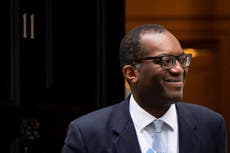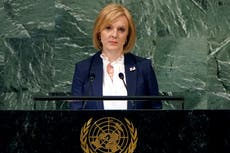Austerity cuts ahead could mean ‘end of NHS’, warns ex-Bank of England deputy
‘Fundamental rethinking’ of the state could lie ahead, says Sir Charlie Bean
The scale of the austerity cuts looming if the Liz Truss government does not reverse course on the economy could result in the end of the NHS, the Bank of England’s former deputy governor has warned.
Sir Charlie Bean said it would be better to “get a Tardis and go back” to undo Kwasi Kwarteng’s mini-Budget – warning that the government was losing the confidence of markets.
“I find it implausible that the measures that are presently being contemplated to boost growth … will be anything like powerful enough to obviate the need for some significant spending cuts,” he told Sky News.
Sir Charlie warned of possible public spending cuts of up to £50bn a year. “Frankly, the only way you can really deal with this is with a very fundamental rethinking of the boundaries of the state.”
On the existential crisis it could pose to the NHS, he said: “So if you want to get the share of government spending to GDP down, you have to be prepared, say, to move away from our own health service, which is free at the point of delivery, to one funded by social insurance like they do in Germany.”
The Bank of England announced on Wednesday that it will launch a temporary programme of buying government bonds as an emergency move to stave off a “material risk to UK financial stability”.
Mr Kwarteng will step up efforts to reassure the City when he meets US investment banks on Wednesday after his mini-Budget spooked markets with a borrowing-fuelled tax cut spree.
Calling the current situation “serious”, the Bank’s former deputy governor warned: “The thing about credulity is when you lose it, it can be quite difficult to get it back. It takes time.”
Sir Charlie urged the Bank’s current monetary policy committee (MPC) to increase interest rates by another 1.5 percentage points to calm the markets. “The evidence from many of these sorts of episodes across the world is that the secret is to go early and go big,” he said.
Labour leader Sir Keir Starmer offered his own warning during his conference speech, saying he was “really worried about how many lives are at risk this winter”.
Sir Keir said: “Talking to doctors in my local hospital, I said ‘the NHS is on its knees, isn’t it?’. They said ‘no, Keir, it’s face down on the floor’.”
The Labour leader also said the International Monetary Fund (IMF) rebuke to UK economic policy was “very, very serious” and urged the government to urgently change course.
In an extraordinary statement on Monday night, the IMF said it was “closely monitoring” developments in the UK – warning of increased inequality and urging the chancellor to “re-evaluate the tax measures”.
The UK’s stock and bond markets have lost more than $500bn in value since Liz Truss took over at No 10 last month, according to an assessment by Bloomberg.
White House economic adviser Brian Deese said he was not surprised by the negative reaction of markets to the UK’s plans. The top Joe Biden adviser said it underscored the need to maintain “fiscal prudence, fiscal discipline”.
Former US Treasury secretary Larry Summers described the situation facing the UK as “very ominous” – adding that it was “the kind of warning that comes much more frequently to emerging markets with new governments”.
Global ratings agency Moody’s warned that the UK’s “unfunded” tax cuts could lead to larger budget deficits and higher interest rates, in the biggest threat yet that the UK’s credit rating could be downgraded.
But Ms Truss’s economics adviser Patrick Minford told The Telegraph: “We should let markets work and pay no attention to idiots who cry ‘crisis’.” And right-wing Brexiteer Lord Frost said the IMF “has consistently advocated highly conventional economic policies”.
Tory MP Sir John Redwood, another prominent Truss supporter, also dismissed the concerns raised by the IMF – saying the international body had been “very wrong”.
Mr Redwood also told Sky News that the Bank of England should be “very cautious” about taking more action on interest rates. He said the policy was “quite tight enough to do the job we need to do which is to get inflation down”.
Join our commenting forum
Join thought-provoking conversations, follow other Independent readers and see their replies
Comments



Bookmark popover
Removed from bookmarks